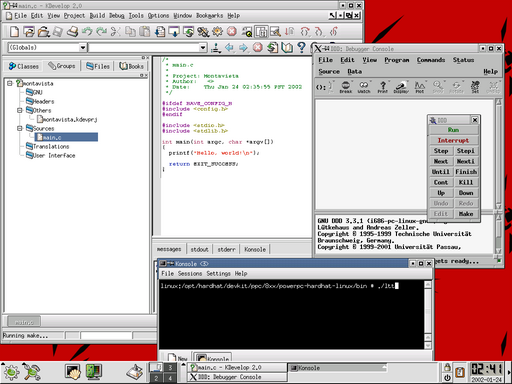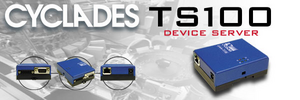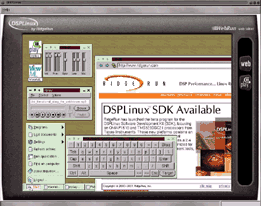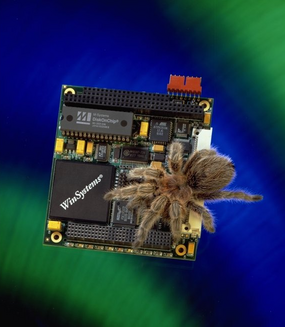ELJonline: New Products (March 2002)
Mar 1, 2002 — by LinuxDevices Staff — from the LinuxDevices Archive — 1 viewsMontaVista's 2.1 Release Adds KDevelop
MontaVista has removed Hard Hat from its name and added the KDevelop integrated development environment (IDE) to its 2.1 release. KDevelop offers a choice of user interface look-and-feel modes, including one that is similar to Microsoft Visual C++. Other changes in the 2.1 release include: 802.11b support; two journaling filesystems, ext3 and reiserfs; support for more hosts including PowerPC Linux; and support for kernel preemption on SMP targets. Microsoft Windows, via VMware, and several Linux distributions running on both x86 and PowerPC are supported hosts. MontaVista Linux 2.1 also targets more than 20 processors from six architectures, including x86/IA-32, PowerPC, StrongARM, XScale, ARM, MIPS and SH. These CPUs constitute more than 60 boards, including 18 new boards, supported by the 2.1 release.

KDevelop offers a choice of user-interface styles, including one that mimics Microsoft Visual C++.
MontaVista Linux 2.1 also offers enhanced customer documentation that follows a typical development cycle. Individual and customized Quick Start Guides for each supported board are also included in this version.
KDevelop is developed by an international group of programmers and licensed under the GNU GPL. MontaVista has contributed some bug fixes and some support for cross-compilation to the KDevelop team. Although MontaVista's contributions are available from individual project sites, the freely downloadable Journeyman edition of the complete distribution will be gone with the 2.1 release and replaced by a demo kit.
Manufacturer: MontaVista Software
Model: Version 2.1
Suggested Retail Price: Contact manufacturer
URL: www.mvista.com
Cyclades-TS100 Device Server
The TS100 has dual 32-bit CPU architecture, a PowerPC CPU for applications and a dedicated RISC CPU for I/O.
The Cyclades-TS100 Device Server is a high-end, high-performance, single-port device server for control and automation applications. It offers extensive flexibility and support for customizations and additional functionality incorporated by the end user or system integrator. The TS100 connects serial devices to the TCP/IP network and can be used in industrial automation, out-of-band network management and retail automation, or it can be used to integrate legacy devices into the network.

First embedded Linux-based device server is about the size of a deck of cards and uses NetLinOS to create a platform that can accommodate custom applications without restrictions.
One Ethernet 10/100BT LAN connection and one RS-232/RS-485, software-selectable, are supported. The TS100 features 4MB Flash memory and 16 MB SDRAM (expandable to 32MB), and security features include SSHv2, socket authentication and packet filtering. Management features are text-based on web interfaces, and a CDK for custom applications is provided. The TS100's dimensions are 2.76″ × 3.35″ × 1.18″.
Manufacturer: Cyclades Corporation
Model: Cyclades-TS100
Suggested Retail Price: $389 US
URL: www.cyclades.com
Embedded Linux Development Suite for DSPs
RidgeRun and Texas Instruments deliver system-level DSPs for embedded and connected applications.
RidgeRun and Texas Instruments (TI) combined efforts on an out-of-the-box development environment for building real-time applications. Based on RidgeRun's DSPLinux OS and board support package (BSP) and TI's programmable, system-level digital signal processors (DSPs), the suite will reduce cost, power consumption and board space for designers of real-time embedded applications. The suite can be used by developers of applications ranging from wireless data, smart pen pads, voice recognition, network security and industrial control. The suite also allows access to real-time algorithms running on code-compatible TI DSPs from the kernel.

The heterogeneous dual-core architecture of TI's system-level DSPs allows optimized task partitioning for increased system performance, utilizing the correct processor for each task.
RidgeRun's contributions to the suite include command-line build tools that support TI's DSPs as well as the ARM7 Thumb RISC processor, a JTAG-based GDB debugger and a kernel with DSP/BIOS bridge support for C54x DSP targets. Over 1,000 existing middleware software packages, communication stacks and other applications available for the ARM7 are also included. Overall, the development suite enables native DSP-enabled performance for low-cost RISC-based systems.
Manufacturer: RidgeRun, Inc. and Texas Instruments
Model: Embedded Linux Development Suite, various bundles
Suggested Retail Price: Depends on bundle
URL: www.ridgerun.com, www.ti.com
PPM-TX
Small, low-power, embedded SBC with Ethernet connectivity that can operate in extreme temperatures.
Targeted for the industrial and data telecommunications and information appliance markets, PPM SBCs do not require fans or forced-air cooling.
WinSystem's PPM-TX is a Pentium MMX-based single-board computer (SBC) designed for networked industrial applications. It provides engineers with a high-performance, low-power and PC-compatible engine in a small size (3.6″ × 3.8″) for deeply embedded applications. The PPM-TX can be configured with either a 166MHz or a 266MHz CPU with 10/100 Ethernet networking capability, four RS-232 serial ports with FIFO and a standard AT peripheral set. It supports expansion with PC/104, PC/104-Plus and USB support and will run PC-compatible software for space- and power-limited embedded designs. The 166MHz board will operate in temperatures ranging from -40° to +85°C, while the range of the 266MHz version is -40° to +60°C.

Targeted for the industrial and data telecommunications and information appliance markets, PPM SBCs do not require fans or forced-air cooling.
Other features of the PPM-TX SBC include 32-128MB of system SDRAM, supported via a 144-pin SODIMM socket; a socket for up to 288MB bootable disk-on-chip or BIOS extension EPROM; the Intel 430TX chipset; bidirectional LPT port with support for EPP/ECP; support for DMA/33 EIDE hard drives; a floppy disk controller with up to two drives; activity LEDs onboard; a real-time clock; and a watchdog timer and power fail reset.
Manufacturer: WinSystems, Inc.
Model: PPM-TX
Suggested Retail Price: $625+ US
URL: www.winsystems.com
Copyright © 2002 Specialized Systems Consultants, Inc. All rights reserved. Embedded Linux Journal Online is a cooperative project of Embedded Linux Journal and LinuxDevices.com.
This article was originally published on LinuxDevices.com and has been donated to the open source community by QuinStreet Inc. Please visit LinuxToday.com for up-to-date news and articles about Linux and open source.